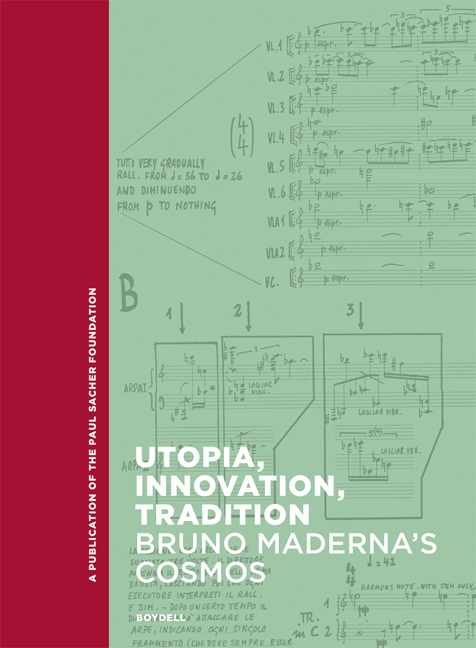Book contents
- Frontmatter
- Contents
- INTRODUCTION
- STAGING AND PERFORMING SOUNDS: A GLANCE THROUGH THE LAST THEATRICAL WORK
- BUILDING SOUNDS: THE COMPOSER
- CREATING SOUND: THE MUSIC BEYOND/WITHOUT THE STAGE
- REINVENTING SOUNDS: DIALOGUES WITH MUSIC OF EVERY EPOCH AND STYLE
- ACROSS BORDERS: THE CONDUCTOR AND THE INTERPRETER
- SEARCHING FOR ROOTS: THE DEVELOPMENT OF A STYLE
- STAGING AND PERFORMING TEXTS: A GLANCE THROUGH EARLY DRAMATURGICAL AND VOCAL WORKS
- Chronology Of Bruno Maderna’s Works
- Selected Bibliography
- Index
Introduction
Published online by Cambridge University Press: 17 January 2024
- Frontmatter
- Contents
- INTRODUCTION
- STAGING AND PERFORMING SOUNDS: A GLANCE THROUGH THE LAST THEATRICAL WORK
- BUILDING SOUNDS: THE COMPOSER
- CREATING SOUND: THE MUSIC BEYOND/WITHOUT THE STAGE
- REINVENTING SOUNDS: DIALOGUES WITH MUSIC OF EVERY EPOCH AND STYLE
- ACROSS BORDERS: THE CONDUCTOR AND THE INTERPRETER
- SEARCHING FOR ROOTS: THE DEVELOPMENT OF A STYLE
- STAGING AND PERFORMING TEXTS: A GLANCE THROUGH EARLY DRAMATURGICAL AND VOCAL WORKS
- Chronology Of Bruno Maderna’s Works
- Selected Bibliography
- Index
Summary
It is, indeed, easier to feel the penetrating and mysterious charme of M. Mallarmé than to define and analyze this charme.
(François Coppée, 1842)In every field of knowledge, in every artistic sector, there are figures who have changed the course of their discipline, with fundamental works and thoughts that challenge the achievements of their predecessors. There are equally revolutionary figures who innovate with a constant sense of doubt, tirelessly interrogating and dialoguing with the past, and building bridges between epochs as they advance inexorably toward the future. These artists, who see continuity as the real catalyst for progress, construct often invisible networks around them – innovative and propulsive undercurrents of thought (both technically and aesthetically) that are revealed mainly in the works of others: of “satellite” friends and colleagues who, in a given moment of their personal and artistic experience, have crossed paths with and entered the orbit of these “creative cosmoses.” The full complexity of these figures and the great influence they have had on the artistic, cultural and social worlds around them often becomes clear long after their deaths, as historical and academic knowledge advances, interpretive tools are refined, and notions and categories once taken for granted are subject to a continuous process of reevaluation.
All of this can be perceived in the artistic and personal life of Bruno Maderna (1920–73) and in the critical and public reception of his works. Fifty years after the composer's death, this and many other aspects continue to evade unambiguous interpretation, offering glimpses of an (everlasting) artistic existence that is yet to be discovered, reflected on, and understood. Within the context of twentieth-century music, or indeed in the broader arc of the history of Western music, Maderna's life and output can be seen as a cosmos in perpetual motion, within which one can recognize, quoting Jean-Paul Sartre on a different topic, an “extraordinary example of the whirligigs of being and appearance, of the imaginary and the real.”1 A whirlwind in which, in Maderna's case, a range of elements collide and intermingle. These include aspects of his private and professional lives, both as a composer and conductor; the contemporary reception of his work; and the narration and interpretation of his creative biography in the immediate aftermath of his death.
- Type
- Chapter
- Information
- Utopia, Innovation, TraditionBruno Maderna's Cosmos, pp. 9 - 16Publisher: Boydell & BrewerPrint publication year: 2023



